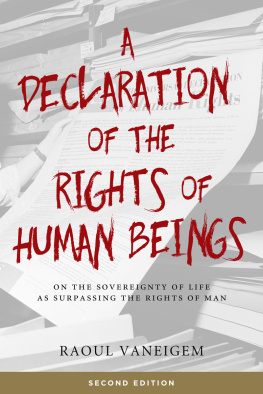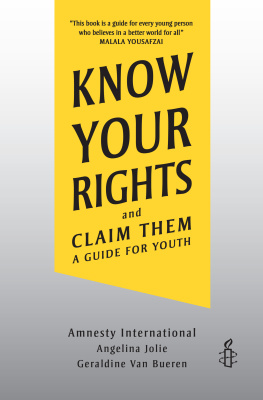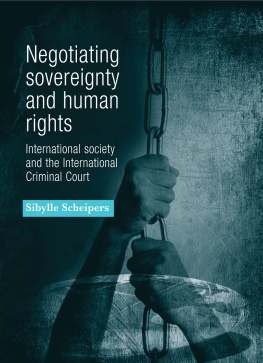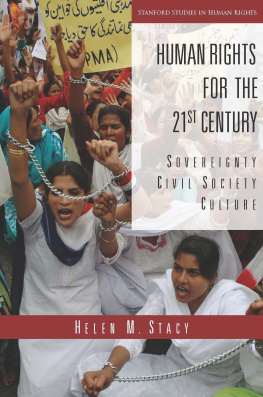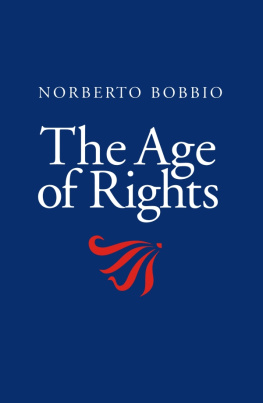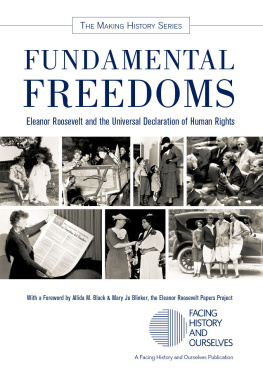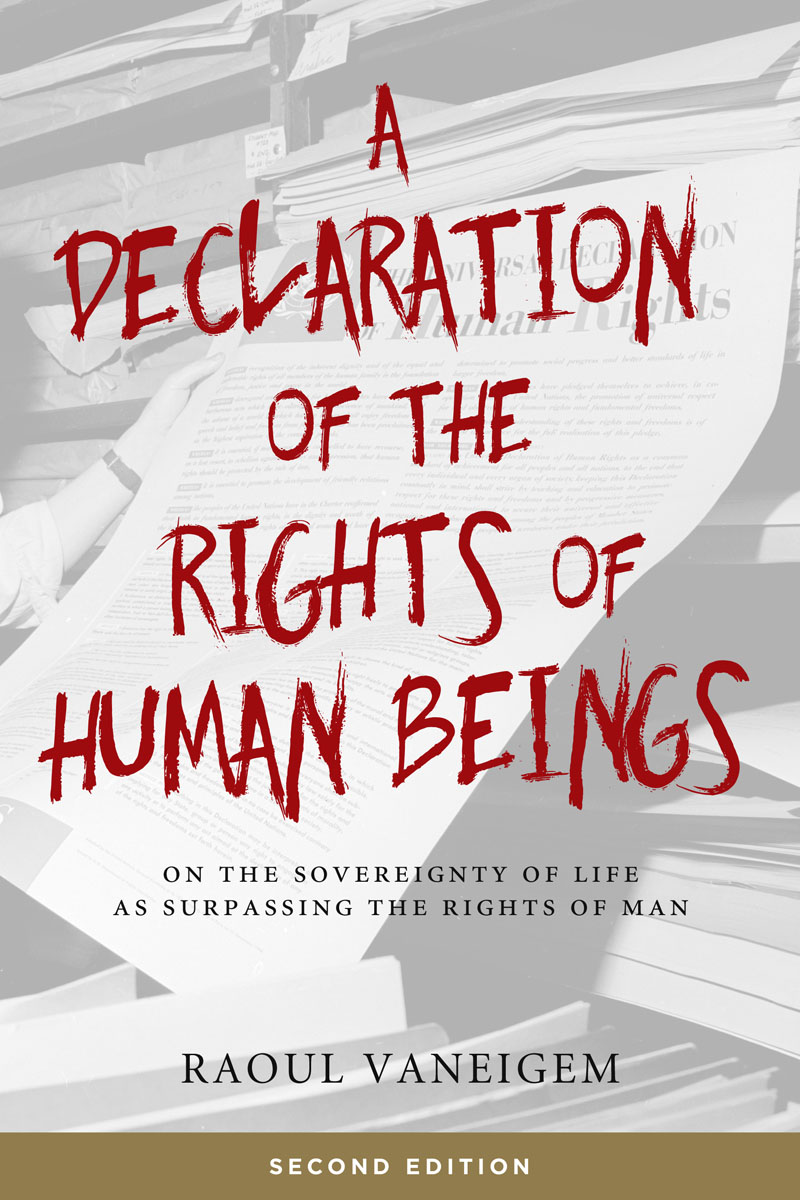
Translators Acknowledgements
My thanks are due to Raoul Vaneigem; also to Francoise Wuilmart and the Belgian translators centre at Seneffe, which provided a hospitable environment for some of the work on this translation and for collaboration with the author. And thanks to Behrouz Safdari and Jalal El Hakmaoui for helpful discussions.
Liz Heron, 2003
A Declaration of the Rights of Human Beings: On the Sovereignty of Life as Surpassing the Rights of Man
Raoul Vaneigem
Original French edition: Dclaration des droits de ltre humain: de la souverainet de la vie comme dpassement des droits de lhomme. Published by Le Cherche Midi, Paris, 2001
Copyright Raoul Vaneigem, 2001
English translation by Liz Heron first published by Pluto, London, 2003. Copyright Liz Heron, 2003
This new edition published by PM Press, Oakland, 2019.
Revised by Donald Nicholson-Smith
Preface 2019 Raoul Vaneigem
Translation 2019 Liz Heron and Donald Nicholson Smith
This edition 2019 PM Press
All rights reserved. No part of this book may be transmitted by any means without permission in writing from the publisher.
ISBN: 9781629631554
Library of Congress Control Number: 2016948153
Cover by John Yates / www.stealworks.com
Interior design by briandesign
10 9 8 7 6 5 4 3 2 1
PM Press
PO Box 23912
Oakland, CA 94623
www.pmpress.org
Printed in the USA by the Employee Owners of Thomson-Shore in Dexter, Michigan.
www.thomsonshore.com
Contents
Preface to the New English Edition
The freedom to live like a human being annuls the supposed freedoms of commerce and predation.
The Declaration of the Rights of Man arose from the demand for free trade by the bourgeoisie of eighteenth-century France in opposition to the monarchist totalitarianism of the ancien rgime.
The will to eliminate the stagnation and despotism of an agrarian economy that hampered the free exchange of goods created a code giving individuals the right to express their opinions freely and throw off the yoke of religion and aristocratic tyranny. By analogy with the free circulation of products, as decreed by economic liberalism, the Enlightenment philosophy exemplified in France by Meslier, Diderot, dHolbach, Rousseau and Voltaire championed a right to the free circulation of ideas in accordance with which the freedom of the individual (already proposed by Rabelais, Montaigne and La Botie) would become the foundation of a society able to progress and answer the vital aspirations of men and women.
We all know what became of the freedom that the economy of industrial capitalism thus stimulated: free trade itself morphed into a kind of totalitarianism, commercial freedoms engulfed human freedoms, and accelerating technological progress left social progress way behindeven though the dream of it continued to haunt a humanity at the mercy of those who, driven by a lust for power and profit, imposed their own law. Happiness, which Saint-Just in his day hailed as a new idea, was transformed in the twentieth century into an ideology, a hedonism commercialised in the interests of a consumer society.
Produced by the French Revolution but soon flouted by it, the Rights of Man have been so completely sanctified that they are now the object of a cult that makes then inaccessible outside the courtrooms of an illusory universal justice, the stamping grounds of hypocritical moral outrage. Continually invoked, they are hardly ever upheld.
A double curse places them out of reach, like icons behind flickering candles. Born of the generous impulses of the Enlightenment, they now serve only as mascots for politicians seeking to cleanse themselves of the usual filth of corrupt democracies and erase all memory of their active or passive support for a rapacious economy that impoverishes and wrecks the lives of millions.
Meanwhile, the ever-widening gulf between the world of ideas and the realities of everyday life points up the absurd and intolerable nature of a metaphysical heaven where thought goes round and round in circles after the fashion of money in its speculative bubble. Such thinking no longer has the slightest importance because our living space is colonised in practice by an economy that evicts being in favour of having and imposes the laws of profit and power everywhere.
There is nevertheless a threshold in the level of oppression beyond which life baulks, recovers an awareness of its fundamental needs and suddenly breaks the chains of servitude.
Before the heaven of dead ideas asphyxiates us, we have to come down to earth and snatch back from the vultures of profit the life they have taken from us throughout our existence, leaving us with nothing but a travesty, a body that wouldnt fetch a penny on a slave market.
Happiness has no price; it cannot be bought; hope cannot sustain it. It has to be constructed, created. Conditions that do not favour its development must be utterly swept away.
We see a world rife with the most atrocious acts of cruelty committed on the greatest range of groundsreligious, ideological, legal, illegal, individual, collective. So there is every good reason to arouse peoples awareness. Not, however, by listing garden-variety forms of sadism that the morbid imagination of repressed individuals has no trouble contemplating with a mixture of compassion and disgust, but rather by confronting everyone with those ideas which, once detached from life, turn into corpses that fill graveyards with good intentions.
Cracks, though, are appearing in the walls of lies that the empire of finance builds as part of its strategy of chaos. State terrorism spews its vomit far and wide by precipitating more and more local wars. If a real war exists beneath the spectacles overblown barbarity, it is the one waged by the multinationals and financial powers against millions of men and women cut off from natural resources, reduced by growing impoverishment, stultified and condemned to brutalisation and suicidal despair.
Against the totalitarianism of profit, the only weapon that cannot be turned against us, that brings neither death nor suffering, is supplied by life itself. Beyond the shipwreck of the old values, new values are emerging. They are founded on solidarity with the forces of life, a response destined, little by little, to find its practice. What this Declaration of the Rights of Human Beings sets forth are still simply principles, but they embody truths capable of dismantling the Kafkaesque machine that is turning the world into a penal colony. The propositions that freedom to live abolishes commercial freedoms and that there is no freedom to kill, exploit, enslave or oppress reflect that will to live, deeply embedded in subject populations, which fuels spontaneous resistance to the dictatorship of profit.
The Rights of Man merely burnished the image of creatures emptied of all substance, wrenched away from their desires and doomed absurdly to the fate of infinitely serviceable beasts of burden.
Men and women must now at long last become what their exploitation and the Gods to which it gave rise have prevented them from becoming, namely human beings.
R.V., November 2015
Translated by Donald Nicholson-Smith
I Critique of the Declaration of the Rights of Man
1. The history of the freedoms granted to human beings has, up until now, been repeatedly confused with the history of the freedoms granted by human beings to the economy.
a) There is no reason for anyone to be surprised, upset or outraged because the freedoms bestowed on men should have been taken away from them, and, having been emptied of their meaning or negated through the use that is made of them, everywhere become inaccessible and illusory, and this even within the very principle of hope that nourished them.
Next page
